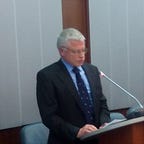Free or Alive
The Controversial Origin of Universal Future
Free or Alive: The Controversial Origin of Universal Future is a book about the meaning of human existence.
Even if armed with the Neocortex — Nature’s most advanced tool for survival, in the whole process of evolution, Homo sapiens never had a viable strategy of individual existence: we cannot run fast enough to escape a cheetah or kill a mammoth for dinner in a one-on-one fight. We, humans, became a success story and reached the grandeur of the Anthropocene age, riding on an initial version of group survival strategy: the tribal thinking.
The “Free or Alive” dilemma is about the controversial nature of humans with free will who are destined to survive in a society. Freedom as a category belongs to life, and Life has no meaning if its material substrate — the biological shell, has been destroyed. The buildings, the scientific discoveries, gadgets, or the masterpieces of art are only byproducts of the fundamental mindset of human beings cooperating in order to stay alive and to have a better life. Staying alive, however, comes at a cost: living in a group restricts individual behavior and limits our freedom to do anything we may spontaneously wish. It is impossible to enjoy both Survival and Freedom to the full extent, and the eternal drama of compromise-making processes evolves vigorously deep in the core of human existence. This shaky magma-like substrate is what Humanity and its future are founded on since the beginning of history.
The current stage of the Homo sapiens evolution is marked by the reality that we, the humans of the 21st century, are energetically building a new world that is being shaped by the interplay of three fundamentally controversial trends which already have reached high intensity: the discrepancy between the technology vector and political vector, the discrepancy between the character of the Anthropocene processes and the capabilities of our stone-age brain that have made our methods of prediction obsolete, and the activities of the AI new-comers who potentially stay beyond the reach of the contemporary human knowledge on autonomous behavior. To complicate the picture even more, the superposition of those three trends can generate emergent features far beyond the logic of human thinking.
The greatest challenge for Homo sapiens in the Anthropocene is to learn how to identify, conceptualize, analyze, prioritize and address the unknown unknowns that exist, evolve, and modify within our reality. Those unknown unknowns have their impact on the things that are crucially important to us while remaining completely stealthy and impalpable for our anthropological sensors. The human brain is the intelligence machine that has guided the survival and the advance of Homo sapiens from their life in the caves into the current Anthropocene, but Anthropocene comes with a new type of sophisticated high-tech based components of our relevant environment, which is by orders more difficult to decipher by our stone-age model of the brain, which was designed even before our life in the caves, and have not changed a lot since. Anthropocene removed most of the essential components of our relevant environment beyond the range of our anatomical receptors. In doing so, Anthropocene rendered dysfunctional the initially highly efficient human paradigm of Truth.
Updating tribal thinking with civilizational thinking originates as an approach to optimizing the entire ecosystem within which the human condition exists and evolves in pursuit of collective survival and sustainable prosperity in the Anthropocene age.
Civilizational thinking is a method how to re-organize the currently decomposed global political space, with state and non-state actors confronting each other, into a Universal Future: a multifaceted platform, on which all polities in their ideological, political, national, cultural, ethnic, religious and racial diversity exist, interrelate and compete with each other without violent conflicts.
